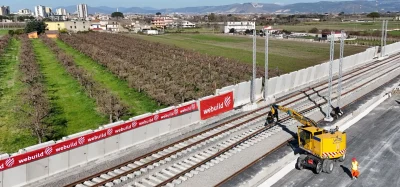Interview Spotlight: Alexandre Savard, Director of Business Development for Rail, GIRO
Posted: 2 September 2020 | Alexandre Savard | No comments yet
Alexandre Savard, Director of Business Development for Rail at GIRO, discusses the challenges and opportunities of planning and delivering an efficient and flexible rail service in an environment of increasing constraints, which have been amplified by the COVID-19 crisis.


What is your perspective on the COVID-19 crisis and its impacts?
The COVID-19 pandemic has sent shock waves across the transportation industry, revealing not only the importance of public and rail transport, but also some fragility. GIRO has been in close contact with many of the 300 public transport and rail operations we support worldwide to discuss their current situation and how they are looking beyond the crisis. All have been affected, but response strategies differ from one country to the next depending on how the pandemic has evolved. Nonetheless, we can expect some lasting changes to the way services are planned and operated. I believe that, despite the sweeping impacts of the current crisis, there is an opportunity to improve some practices and even rethink how passenger rail adapts to changing circumstances.
How has GIRO had to adapt to meet the changing needs of rail operators?
R&D has been at the core of GIRO for the last 40 years. We devote more than 30 per cent of our resources to meeting industry challenges; specifically, by developing resource-planning and management software solutions built on globally recognised optimisation algorithms. In recent years, GIRO has significantly boosted its R&D efforts in passenger rail to better meet the increasingly complex task of achieving efficient service planning and operations. Most notably, we have greatly enhanced the functionality of our HASTUS platform to improve the planning of train schedules, track access and maintenance. This allows rail operators to design services with even more robust, responsive and efficient resource management. These innovations are almost always achieved in collaboration with operators from around the world – such as SNCF in France, where GIRO’s solutions have recently been deployed on its urban, regional and national high‑speed rail networks. Integrating the best practices from around the world in a mature platform brings value to the whole industry.
How can rail operators benefit from integrated resource planning?
Most operators face similar challenges, such as breaking down silos and optimising costs and resources. Historically, planning has been broken up by phase (studies, long/short-term planning, operations, etc.) and by resource types (infrastructure, rolling stock, on-board staff, station staff, etc.). This division is not inherently bad, but it can introduce cumbersome processes and errors at each stage. Given the interdependency of resources, any changes to the plan can lead to changes in train schedules, which in turn can impact on the assigned duties of employees. It’s easy to appreciate the massive challenge this presents to operators striving to deliver high-quality service levels while managing costs. With the financial and operational constraints the industry is currently facing, this challenge becomes even greater.
GIRO strongly believes that the integrated planning and management of resources right up to the day of operation is key to meeting this challenge. While it takes a wide range of expertise to ensure complete coverage, GIRO provides operators with a fully integrated software environment to plan, optimise, adapt and manage their service efficiently within the many constraints facing rail. This is a paradigm shift for many rail operators, who often use multiple tools and teams to manage these resources.
What is your perspective for the future?
Although it’s impossible to predict the future in these uncertain times, the rail industry is known for its resilience and long-term vision. We can expect lasting changes to be introduced to meet the new needs of passengers and ensure their safety. More than ever, rail operators will need to be flexible and efficient in planning and delivering their service. The industry’s ability to face current and future challenges will be fundamental to it remaining the backbone of mobility.


Issue
Related topics
Coronavirus/COVID-19, Regulation & Legislation, Technology & Software







